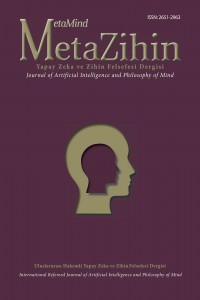Bilgi Argümanına Bir Yanıt Olarak Öznel Fizikselcilik
öznel fizikselcilik, bilgi argümanı, fiziksellik, görüngüsel bilgi, bilinç, öznellik
Subjective Physicalism as a Response to the Knowledge Argument
subjective physicalism, the knowledge argument, physicality, phenomenal knowledge, consciousness, subjectivity,
___
- Alter, T. (1998). “A Limited Defense of the Knowledge Argument.” Philosophical Studies, 90(1): 35–56.
- Balog, K. (2012). “In Defense of the Phenomenal Concept Strategy.” Philosophy and Phenomenological Research, 84(1): 1-23.
- Bealer, G. (1994). “Mental Properties.” The Journal of Philosophy, 91(4): 185–208.
- Byrne, A. (2002). “Something about Mary.” Grazer Philosophische Studien, 62: 123–140.
- Chalmers, D. J. (1996). The Conscious Mind: In Search of a Fundamental Theory. Oxford University Press.
- Churchland, P. M. (1985). “Reduction, Qualia and the Direct Introspection of Brain States.” Journal of Philosophy, 82(January): 8-28.
- Conee, E. (1994). “Phenomenal Knowledge.” Australasian Journal of Philosophy, 72(2): 136–50.
- Dennett, D. C. (2004). “Epiphenomenal Qualia?” In P. Ludlow, D. Stoljar & Y. Nagasawa (Eds.), There's Something About Mary: Essays on Phenomenal Consciousness and Frank Jackson's Knowledge Argument. Cambridge, MA: MIT Press.
- Flanagan, O. J. (1992). Consciousness Reconsidered. Cambridge, MA: MIT Press.
- Horgan, T. (1984). “Jackson on Physical Information and Qualia.” Philosophical Quarterly, 34: 147-52.
- Howell, R. J. (2008). “Subjective Physicalism.” In E. Wright (Ed.), The Case for Qualia. Cambridge, MA: MIT Press.
- Howell, R. J. (2009). “The Ontology of Subjective Physicalism.” Noûs, 43(2): 315–45.
- Howell, R. J. (2013). Consciousness and the Limits of Objectivity: The Case for Subjective Physicalism. Oxford University Press.
- Jackson, F. (1982). “Epiphenomenal Qualia.” The Philosophical Quarterly, 32(127): 127–36. DOI: 10.2307/2960077
- Jackson, F. (1986). “What Mary Didn’t Know.” The Journal of Philosophy, 83(5): 291–95. DOI: 10.2307/2026143
- Jackson, F. (1998). From Metaphysics to Ethics: A Defence of Conceptual Analysis. Oxford University Press.
- Kıymaz, T. (Forthcoming). “Phenomenal Concepts and Physical Facts: A Dialogue with Mary.” Filozofia: Journal for Philosophy.
- Levin, J. (2007). “What is a phenomenal concept?” In A. Torin, and S. Walter (Eds.), Phenomenal Concepts and Phenomenal Knowledge (pp. 87-110). Oxford University Press.
- Lewis, D. (1983a). Postscript to "Mad Pain and Martian Pain.” Philosophical Papers, 12: 130-133.
- Lewis, D. (1983b). “New work for a theory of universals.” Australasian Journal of Philosophy, 61(4): 343-377.
- Lewis, D. (2004). “What Experience Teaches.” In P. Ludlow, D. Stoljar & Y. Nagasawa (Eds.), There's Something About Mary: Essays on Phenomenal Consciousness and Frank Jackson's Knowledge Argument. MIT Press.
- Loar, B. (2004). “Phenomenal States (Revised Version).” In P. Ludlow, D. Stoljar & Y. Nagasawa (Eds.), There's Something About Mary: Essays on Phenomenal Consciousness and Frank Jackson's Knowledge Argument. MIT Press.
- Nemirow, L. (1980). "Review of Nagel's Mortal Questions." Philosophical Review, 89: 473-477.
- Nemirow, L. (1990). “Physicalism and the Cognitive Role of Acquaintance.” In W. Lycan (Ed.), Mind and Cognition: A Reader. Oxford: Blackwells.
- Nida-Rümelin, M. (2015). “Qualia: The Knowledge Argument.” In E. N. Zalta (Ed.), The Stanford Encyclopedia of Philosophy (Summer 2015 Edition). Alındığı URL: https://plato.stanford.edu/archives/sum2015/entries/qualia-knowledge/
- Papineau, D. (2002). Thinking about Consciousness. Oxford: Clarendon Press.
- Papineau, D. (2007). “Phenomenal and perceptual concepts.” In A. Torin, and S. Walter (Eds.), Phenomenal Concepts and Phenomenal Knowledge (pp. 111-114). Oxford University Press.
- Stemmer, N. (1989). “Physicalism and the Argument from Knowledge.” Australasian Journal of Philosophy, 67(March): 84–91.
- Stoljar, D. (2005). “Physicalism and Phenomenal Concepts.” Mind & Language, 20(5): 469–94. DOI: 10.1111/j.0268-1064.2005.00296.x
- Strawson, G. (2006) “Realistic Monism: Why Physicalism Entails Panpsychism.” Journal of Consciousness Studies, 13(10-11): 3-31.
- Tye, M. (2009). Consciousness Revisited: Materialism Without Phenomenal Concepts. Cambridge, MA: MIT Press.
- Van Gulick, R. (2004). “So Many Ways of Saying No to Mary.” In P. Ludlow, D. Stoljar & Y. Nagasawa (Eds.), There's Something About Mary: Essays on Phenomenal Consciousness and Frank Jackson's Knowledge Argument. Cambridge, MA: MIT Press.
- ISSN: 2651-2963
- Yayın Aralığı: Yılda 2 Sayı
- Başlangıç: 2018
- Yayıncı: Murat ARICI
Aristoteles’te Ortak Duyu ve Hayal Gücünün Birliği Üzerine
Benleştiren (Saf) Ben ve Benleşen (Ampirik) Ben
Yapay Zekâ ve Tekillik: Teknolojik Tekillik Bize Ne Kadar Yakın ve Neden Önemli?
Descartes'ın Zihin Teorisi ve Sınırları
Bilgi Argümanına Bir Yanıt Olarak Öznel Fizikselcilik
Tractatus Logico-Philosophicus’ta Mantıksal Biçimin Koordinatları ve Solipsizm Eleştirisi
